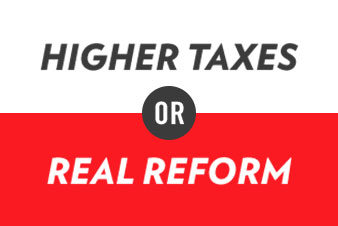Media

Is a Budget Deja Vu in Pennsylvania’s Future?
The General Assembly is floating a plan to balance the state budget with higher taxes and more borrowing, according to Charles Thompson of PennLive. Sound familiar? Lawmakers adopted these same ideas last summer to balance the current budget. It didn't work.
Revenues have not kept pace with spending growth—a combination that has produced a $1.4 billion deficit this year. Despite the economic hardships the state's overspending and higher taxes have caused, lawmakers appear to be considering more of the same.
Borrowing
A proposal to borrow approximately $1.7 billion against the state's tobacco settlement payments looks to be gaining traction in the legislature. Proponents of the plan see it as an infusion of cash into state coffers without raising sales and income taxes. Yet, this is still the wrong direction for the commonwealth, as borrowing increases costs over a longer period and delays the structural reforms needed to get the state's fiscal house in order.
Pennsylvania is still dealing with the consequences of its decision to borrow last year. The Pennsylvania Professional Liability Joint Underwriting Association has sued the state for removing $200 million out of a state medical malpractice insurance fund. A lawsuit and other unnecessary headaches could have been avoided if spending restraint was prioritized over quick fixes.
Higher Taxes
Two potential tax increases are on the table. The first involves changing the tax structure on liquor from a wholesale tax to a retail tax. Officials estimate the tax could raise $200 million in additional revenue for the state.
The second is a new tax on financial transactions. The tax would affect businesses that buy and sell space on energy transmission lines, according to PennLive. Overall the tax could raise $125 million. Some argue the tax wouldn’t adversely affect Pennsylvania residents, though this claim defies common sense. Taxes are included in the cost of doing business, costs which are passed on to workers or consumers in the form of reduced compensation or higher prices.
Together, the two proposals would amount to a $325 million tax increase. This would be the second year in a row a state budget has included tax increases. Last year, lawmakers voted to raise taxes by $650 million. Not only did the tax increases fail to balance the budget, but they put dozens of entrepreneurs out of work.
The mistakes of the past do not have to be repeated. Lawmakers can prevent a budget déjà vu by adopting solutions to reduce costs and reinvent government. Some solutions include:
- Reducing $800 million in corporate welfare,
- Privatizing the state-run liquor stores,
- Scaling back the commonwealth’s “shadow budget.”
This list isn't exhaustive, but would both help reduce the current deficit and provide recurring revenues in each successive budget cycle.
With Pennsylvania's economy still struggling, now is the time to abandon the old ways of the past and embrace real solutions that capture the Keystone State's potential and transform it into a hub of economic opportunity.